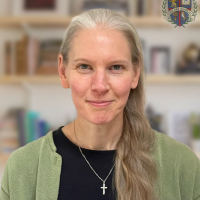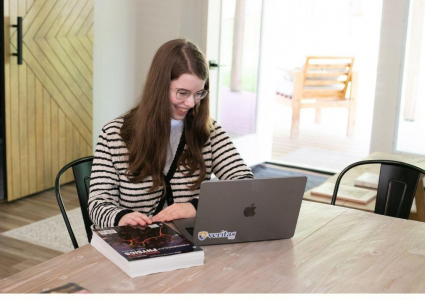All About Composition II

Wondering what Composition II course covers and if it’s right for your student? Watch this video to hear directly from Melissa Stewart, VSA Teacher.
Episode Transcription
Note: This transcription may vary from the words used in the original episode for better readability.
I am Melissa Stewart, and I have taught a single course at Veritas for seven years, and that's Composition II. And I'm just stuck with this course because I love it. And a few years ago, we got a new book. You can see it there on the slide. I want to assure you, like Mrs. King did, you can hold it in your hands.
We have an e-book version as well, but we changed curriculum, and I really like the new book! It was a work in progress, but I really have enjoyed the switch to this new material, and I think it works really well. This is the last stop for a lot of students in our Grammar and Writing continuum. So I feel the pressure of being able to prepare our students for higher level writing, whether that's here at Veritas or as they go off to other learning environments, off to college.
My students are from eighth grade all the way up to 12th grade. I have the number of seniors each year, and it's a joy to work with them and to know that we are equipping them for independence on the one hand and being a solid member of a writing community on the other hand. So it's this weird combination, and I keep telling my students, “I'm working myself out of a job. I'm not going to college with you. I'm not going to hold your hand through this. You've got to learn independently how to tackle a big project or, you know, a big writing assignment when the teacher, when the professor, doesn't lay it all out for you step by step.”
So I want them to be independent. And yet we also stress peer review time and working in a group and saying more than, “Good job,” when you're working in a peer review session and really allowing them to take some ownership and accountability within a group.
So those are two goals that I have for my students in Comp 2. Let me go through some of our routine here. Actually, you know, I'm going to jump to the next slide and then work back. I want you to see some of the things we actually doing in the class, the concrete part here, and then we'll go back and just look step by step at a typical class period.
This book is set up that we start with informal writing, we move to formal, and then we finish the year with a final informal piece, the showcase piece that the year starts with a blog post, which I was kind of suspicious of when I first saw the draft of this textbook. And I thought, “Why are we teaching students blog posts?” But the truth is, blog posts are not just about what you have for breakfast or, you know, really informal voice, but it's something that the corporate world has jumped into. So teaching students this type of writing is actually a really useful life skill. It also helps me to get to know my students because they get to write on something that they're interested in, and then we create a class blog, and they put their blog posts on that blog, and they're getting to know one another as well.
We move from there to more formal essays, and I'll just stop on the research portfolio and essay because that's where we are now in the third quarter. And that is that's a big project for these students. If they don't have a solid background in being able to create a thesis statement or learn to find reputable sources for research, they're going to struggle some at this stage. We teach into that for sure, but at this point in the third quarter, I'm giving them a month to build a research portfolio that includes the thesis and outline and ten reputable sources that could be used for their final essay summaries of all of those sources, evaluations, and analysis of the argument in each of the sources.
So there's a lot of work to this research portfolio even before they draft their essay. I go through those drafts, and by the end of the third quarter, we're all pretty drained. And again, I questioned the lineup here to move from something as big as a research essay to a creative writing piece at the end of the year.
But it works so well! Because by the time we get to the fourth quarter, we really need a break. And the students can write a short story or a one-act play or a personal essay. And I must say, for my juniors and seniors, I kind of steer them toward the personal essay. They get to choose, but it's something that will be really valuable for them as they're applying for colleges and scholarships to be able to write a solid personal essay.
Now that's those are the major projects. Let's go back a step and just look at the routine. We start out with a sentence study, and like Mrs. VanRyan said, we're not teaching grammar overtly at this level, but the sentence study is a sentence or a short passage from usually one of the Omnibus books, and it's just beautiful writing from skilled writers.
So I might have a student read the sentence and then give them some guided questions on “Why is that colon there or why a semicolon? Or what do you think the writer use the passive voice here?” And, of course, content as well, just the beautiful content that comes out of those sentence studies. But we do nitpick a little bit, but it's kind of a writer-to-writer like, okay, we're writers at a higher level now, and we're going to study the great writers throughout history and learn from the masters.
We love semicolons! I actually have a whole book on the semicolon, which I'd be glad to loan anyone who's that interested in a single punctuation mark. We always have some kind of a review time at the beginning of class, and then both in the first and second semesters, students get to present. They get to put together a slideshow that presents some rhetorical device.
And these are literary or rhetorical devices like metaphors or alliteration, or repetition, the use of questions and get to teach the class, and create original examples. They also find literary examples to share with us. And then the direct application of that material is that they have to use a certain number of rhetorical devices in each of those major projects.
So we don't just sit back and listen passively. We know that we're going to be held accountable for that information. And the students do a wonderful job putting together those presentations. We're at a higher level. These are high school students, for the most part, and they should be able to teach a lesson like that. Those are all preliminary activities.
Our actual lesson time looks different depending on where we are in our project work. An example of a typical lesson would be something doing this week where they're creating their thesis– an outline for this research portfolio, and I'm putting them into breakout rooms tomorrow and Thursday, and they're sharing parts of that research portfolio. So they have to look at the requirements again and look at the rubric that we're using and examine one another's work.
So they'll examine the thesis statement first. For example, and make sure that has all of us part parts and that the elements are clear that they're using two parallel format. All of that. We use rubrics for all of the major writing projects, and I encourage the students; I walk through the rubrics with them, and I encourage them to look at their own work and even score their own work before turning it in.
Because at this level, like I said, I want independent writers. I want them to be able to look at their own work and see the strengths and weaknesses and edit for themselves and revise as needed. So we walk through those rubrics, and I'll even give them sample essays and say, “Okay, guys, you are the teachers. Now get out your red pens and get ready to grade this sample essay.”
And they love that. But again, it gives them ownership of the material, gives them familiarity with what the teacher sees, and creates that independence that I'm trying to foster here. But we do it in community. They're working in a group to come up with a shared grade that they all have to kind of work together to achieve.
Writing workshop, peer review, teacher conferencing. A lot of our writing happens during class. We're all the students, here’s 20 minutes, we're going to work together. And that allows me to touch base with the students as well. If we're not in the throes of a research portfolio or, you know, at a critical point in those projects, we have a lot of discussions around just word choice and denotation versus connotation and how to structure a sentence that the most important word is going to stand out, how to change the wording a little bit with those rhetorical devices so that the effect is different on your audience.
We talk a lot about voice and knowing who your audience is, and being able to meet them where they're at. So you're going to know what your audience knows. So many things. It's a really intriguing class, and the students bring so much to it. And I can tell the ones who have been through these other courses because they come in just ready to go, and that's exciting.
I have other students who have never been in a formal writing class– that’s okay! They're along for the ride, and they're going to work hard. But I think they'll find it really valuable and rewarding. And someone earlier, may have been Mrs. Southern talked about process and product. They're both important, right? You know, I want to see a beautifully polished final essay, but I want them to understand the process of getting there really well and to bring alongside those other students to be a community of encouragers that can help one another get to that destination as well.
So that, in a nutshell, is the composition to class. It's a really good course. I'm blessed to teach it!
Here are the details. So this minimum age of 13, that's a little young. It depends on the students, and like I said, I've had students all the way up to age 18 take this class. Typically, they're in high school by the time they get into the composition to class.







